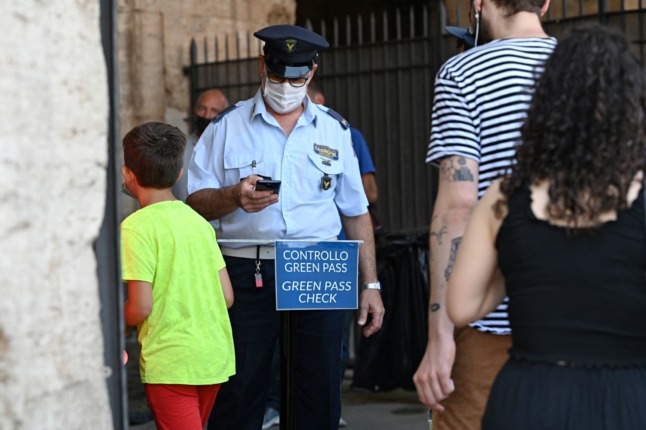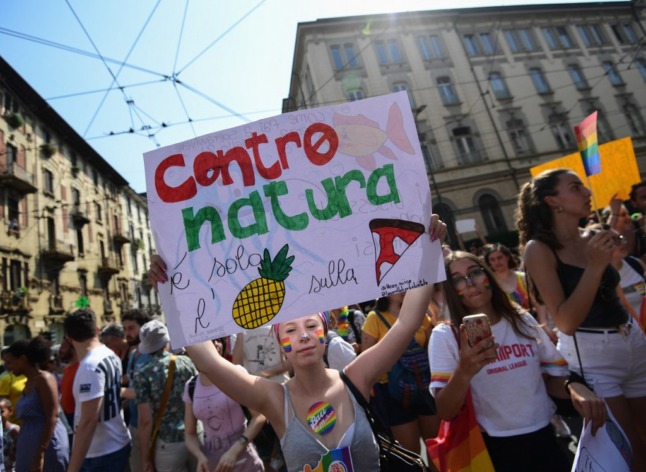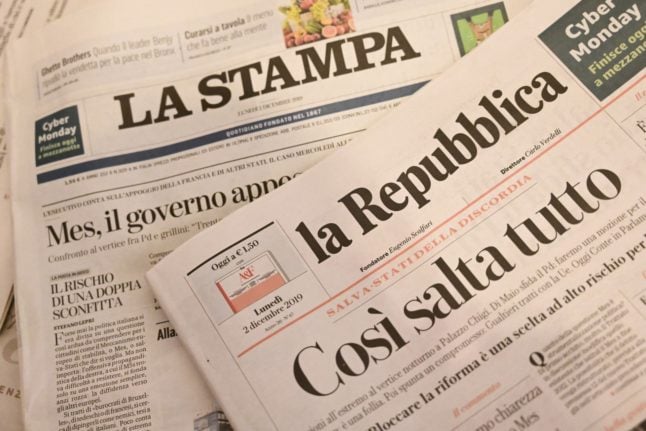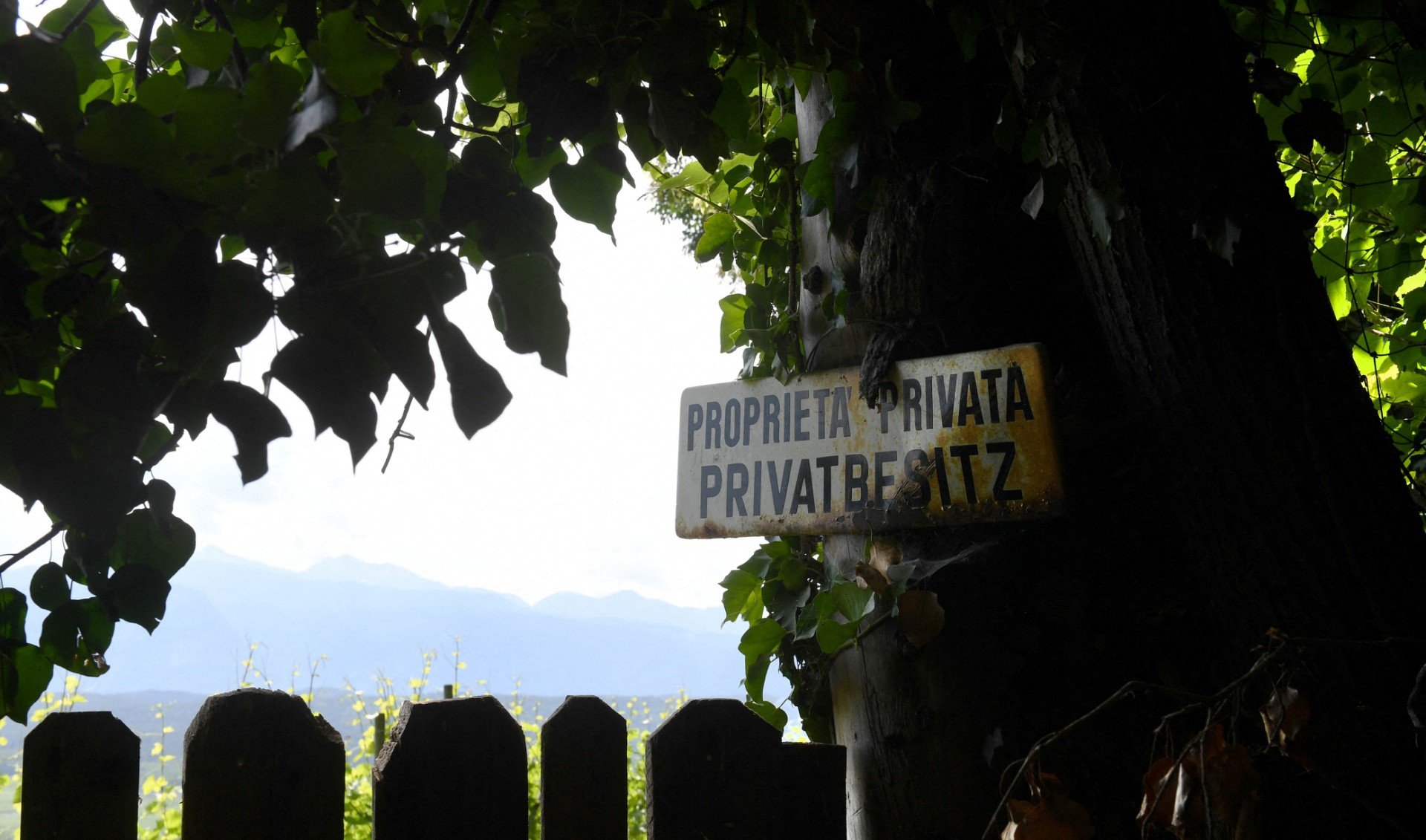At the end of every year, the latest edition of Italian vocabulary guide Nuovo Devoto-Oli explains hundreds of words and phrases that have become part of daily conversation in Italy over the past 12 months.
The list features everything from teenage slang to political terminology, and while the terms aren’t always brand new – and are often borrowed from English – they reflect current events and hot conversation topics in Italy at the moment.
READ ALSO: 10 of the most common Italian translation fails
Unsurprisingly, this year’s list is dominated by talk of the ongoing coronavirus pandemic – but beyond that, topics such as the climate crisis, sustainability, gender issues and the economic situation also feature prominently.
Comparing the vocabulary guide’s new entries with words recognised this year by Italy’s language guardians at the Accademia della Crusca and lists of the most popular Google search terms in Italy, here’s The Local’s pick of the ‘new’ words and phrases that tell us something about life in Italy in 2021.
Covidico
Among the countless Covid-related words and phrases to enter the lexicon in pandemic times, it should be noted that along with ‘positivo’, ‘contagiato’ or ‘infettato’ the Italian language has a new word for someone who has tested positive for the virus: ‘Covidico’.
The term, which is not currently recognised by the Accademia della Crusca, is also sometimes used to replace ‘Covid’ as an adjective.
– Il nuovo mondo post-Covidico
– The new post-Covid world
But is this grammatically correct? The Treccani dictionary doesn’t think so. It says this term “doesn’t seem appropriate” since the ‘-ico’ suffix “usually indicates belonging”, such as to a genre, discipline, group or region.
Treccani suggests the alternative term ‘covidotic’ would be preferable, even though it admits the construction is “a little awkward”. The similarity of the word ‘covidotic’ to ‘covidiot’ (another term now frequently used in Italy, according to Nuovo Devoto-Oli) probably doesn’t help, either.
The vocabulary list also notes the new usage in Italy of the term ‘Covid free’, which despite being in English was coined by Italian authorities to describe flights on which all passengers are tested multiple times ahead of boarding. It was later used to describe holiday islands which local authorities claimed had few or no Covid cases this summer in a bid to lure back tourists.
Green pass
This one needs no introduction, since it’s a term we’ve all been using daily in Italy since at least August this year when the pass – which proves vaccination, testing or recovery – became mandatory in order to access restaurants, cinemas, theatres, museums and many other public places. The government has since expanded the scheme multiple times and the rule now covers everything from workplaces to public transport.
Amid endless debates and regular protests over the ‘green pass’ rules, as well as widespread public confusion and reports of technical problems in the first few months of the scheme, perhaps it’s no surprise that ‘green pass’ was the most searched-for pandemic related term in Italy this year according to Google Trends, as well as associated phrases including come funziona il green pass?.(how does the green pass work?)
READ ALSO: The Italian words and phrases we’ve learned during the coronavirus crisis
After initially referring to it as the certificazione verde, Italian authorities have now joined the media and the public in using the English term ‘green pass’.almost exclusively on official websites.
Meanwhile, a new, more restricted version of the pass, accessible only via vaccination or recovery and not testing, is referred to as a ‘super green pass’ in Italian media, but the government continues to use the more sober term ‘green pass rafforzato’ (reinforced green pass).
– Hai il tuo green pass?
– Have you got your green pass?

Photo: Marco Bertorello/AFP
Long Covid
Another pandemic-related term in English that you’ll often hear used in Italian conversation: the term ‘long Covid’ is, according to Italy’s Accademia della Crusca, an English loan phrase – but not adapted from English usage. It’s believed to have been coined by Italian researcher Elisa Perego in 2020.
The term is used to describe what the WHO calls ‘post Covid-19 condition.’ In Italy, the term ‘long Covid’ is far more widely used than the Italian equivalents ‘Covid lungo’ or ‘Covid a lungo termine’, the Accademia della Crusca notes.
Booster
A year after Italy administered its first doses of anti-Covid-19 vaccines on December 27th, 2020, the country has reached one of the highest vaccination coverage rates in Europe with almost 90 percent having had at least one shot.
Third doses or booster jabs are now seen a priority in Italy, with health authorities offering them to more and more groups in efforts to keep immunity high amid rising case numbers.
Italian media and some health professionals have however caused no shortage of confusion by widely adopting the English-language term ‘booster’; the word is commonly misheard, especially by older Italians, as ‘busta‘ (envelope’.
– Perché devo prendere la mia busta?
– Non busta, nonna. Booster. La terza dose del vaccino.
– Why do I need to go and get my envelope?
– Not envelope, grandma. Booster. The third dose of the vaccine.
Azzurri
Moving away from pandemic-related vocab, the word ’Azzurri’ (blues) also featured on Google’s Italian most-searched list – appropriately enough, as Italy achieved success after success in sporting events in 2021.
‘Gli Azzurri’ is not just the name given to Italy’s national football team, but blue is the colour worn by all Italian athletes (and here’s why, in case you’re wondering.)
-Gli Azzurri l’hanno vinta ancora!
-The Azzurri have won it again!
Meanwhile, language website Babbel included ‘Riscossa azzurra’ (literally translated as ‘blue redemption’) on its list of words for 2021, defining it as meaning “the reconquest of titles and cups long absent from Italian trophy cabinets”..
“Never before has Italy achieved so many successes in sport and entertainment as this year,” Babbel notes, listing Italy’s Euro 2020 cup win in July, the first Wimbledon final in Italian history and a haul of 40l medals at the Tokyo Olympics, with two gold medals for Italy in the 100 metres and high jump.
READ ALSO:
- ‘Do Italy just win everything now?’: Celebrations after Italian athletes take Olympic gold
- Why do Italian athletes wear blue?
- PHOTOS: Italy’s most memorable medals at the Tokyo 2020 Olympic Games

Metaverso
This term, which somewhat obviously translates to ‘metaverse’ in English, has been heard everywhere recently and Italy is no exception. Google Trends revealed it was another popular search term towards the end of this year.
You’ve no doubt heard the word used in discussions about online giants such as Facebook, newly renamed “Meta”, ruling over the entire internet. The word (in English) was coined in 1992 by American author Neal Stephenson in his novel Snow Crash, and is used to describe a virtual reality where all digital content exists in an infinite multidimensional space.
– Non voglio essere nel metaverso di Mark Zuckerberg!
– I don’t want to be in Mark Zuckerberg’s metaverse!
READ ALSO: How do Italians eat spaghetti? The Local answers Google’s questions
Inclusione
The Italian word for inclusion featured on the vocabulary list in a year when equality and social justice issues were higher on the agenda than ever before.
‘Inclusione‘ has been used primarily in discussions around Italy’s ‘Zan bill’, a proposed law against discrimination and violence based on gender, disability or sexual orientation. The law was aimed at improving inclusion and equal opportunities – and proponents say it would have represented a major turning point for Italian society.
The bill proved highly controversial, dominating political discussion in the country for months after protests from the Vatican. It was eventually shot down in October amid staunch opposition from conservative and hard-right parties including the League and Brothers of Italy. But public discussion of the proposal, and the injustices it aimed to prevent, has not gone away.
Another related word included on the list for much the same reason was abilismo, a term describing “discrimination or prejudice against, or marginalisation of, disabled people”, which has only recently come into common use in Italy.

Schwa
Speaking of equality, using gendered terms in Italian may seem unavoidable – after all, every noun in the language is designated either masculine or feminine gender (there’s no neutral in Italian). But some campaigners would like to phase this out, and to stop using masculine terms as the default.
This, some suggest, could be done by replacing the ‘o’ or ‘a’ at the end of words with a short, neutral or indistinguishable “mid-vowel” sound known in phonics as a ‘schwa’. As language students may know, the schwa phoneme /ə/ denotes the most common vowel sound in spoken English, which sounds a bit like an ‘uh’.
But Italy’s language guardians at the Accademia della Crusca don’t seem keen on the idea at all. A widely reported-on essay by Paolo D’Achille, one of the country’s leading experts on the Italian language, warned back in September of the dangers of a genderless final vowel.
READ ALSO: Campaign demands Italian dictionary change its ‘sexist’ definition of word ‘woman’
Proponents say they don’t intend to destroy the Italian language, but to make it more inclusive and to challenge male dominance in Italian society and its reflection in language.
Gender-neutral language is increasingly seen in written Italian, particularly on social media, in the form of an ‘x’ or an asterisk at the end of words where the ‘a’ or ‘o’ would usually go.
Whether or not the idea catches on, new discussion of the use of the schwa in Italian is another sign of the times and of changing attitudes in the country.
Transizione (ecologica)
In 2021, Italy’s new government established the first Ministero della Transizione Ecologica (Ministry for the Ecological Transition), a department which replaced the Environment Ministry and is tasked with overseeing energy efficiency improvements and other moves to combat climate change – and has been handed a large share of the funding for Italy’s NRRP, the National Recovery and Resilience Plan, to help it do so. It’s behind a lot of the country’s ‘bonus’ schemes aimed at boosting cleaner technology and the circular economy – one example being the new TV discount.
The word transizione saw peaks in use at the beginning of the year, as awareness of the climate emergency grew in Italy and worldwide.
As this year also saw major events including the Cop 26 climate summit and Sicily recording Europe’s hottest-ever temperature, it’s no surprise that many other climate-related words were much more frequently used online in 2021.
READ ALSO: Ten phrases to talk about cold and wet weather like a true Italian
Social media giant Facebook (AKA Meta) said it had seen a surge in the use of terms including auto elettrica (electric car), mobilità sostenibile (sustainable transport), pannello solare termico (thermal solar panel), pompa di calore (heat pump, and risparmio energetico (energy saving) – usage no doubt also related to the surges in energy prices this year in Italy and many other countries.
Turismo di prossimità
This newly-popular phrase describes a concept we’ve all become more familiar with since the pandemic put a stop to most travel plans: ‘proximity’ or local tourism.
Italy’s once-booming international tourism industry continues to be badly hit by Covid-related travel restrictions. But Italians, who have always liked to travel within their own country (and who could blame them?) are increasingly booking trips close to home instead of to far-flung destinations.
OPINION: Italy must update its image if it wants a new kind of tourism
One blogger at travel website Vologratis defined the concept as “travel to destinations close to home that can be reached mainly by car… and the rediscovery of slow tourism.”
“Many will return to the Italian vacation habits of a few decades ago, in which they rented an apartment within 100 kilometres from home,” the blog predicted.
But it’s not only the pandemic driving changes to the way people travel, with Italy’s new government pledging this year to encourage more sustainable travel in future and a move away from the mass tourism previously causing friction with residents of Italian cities like Florence and Venice.
See our Italian language section for more.




 Please whitelist us to continue reading.
Please whitelist us to continue reading.
Member comments